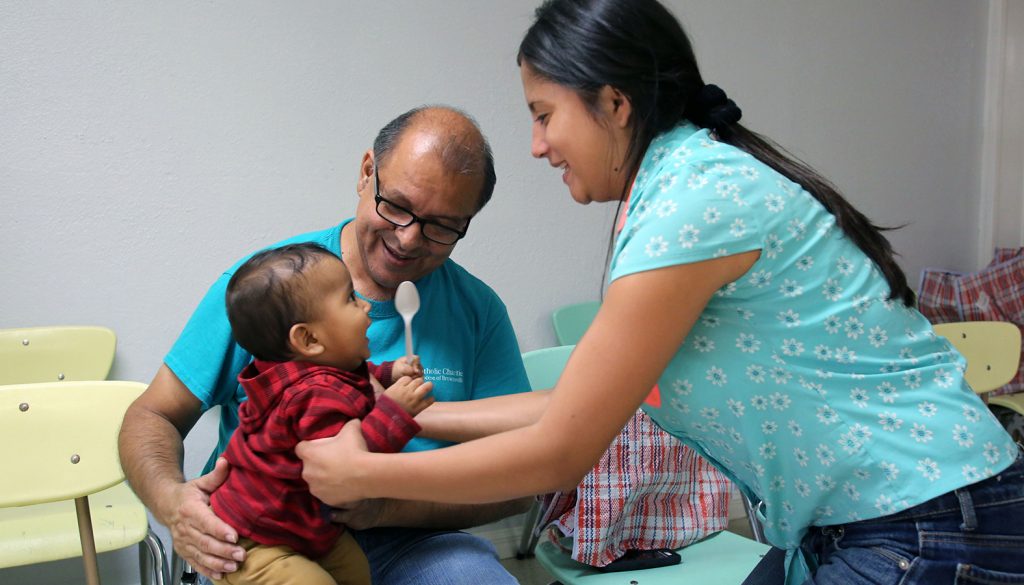I have been reflecting on Pope Francis’ message for the annual World Day of Peace and the challenges we face as we emerge from the pandemic.
As Catholics, how do we understand and address these challenges — the threats to peace, the economic hardships, all the troubling social conditions and injustices we find in the world? The pope counsels that we can find “sure guidelines in the Church’s social doctrine.”
And he is right.
Catholic social teaching may be the Church’s best kept secret. I am surprised how often I meet people, even many good Catholics, who do not know that the Church has her own teaching about what makes for a good society.
The Church’s teaching includes a moral analysis of what governments and economies are for, a vision of who the human person is and what makes for human happiness, and includes the demand that all believers work, not just for the salvation of our neighbors’ souls, but for a world that protects their rights and dignity.
The Catechism of the Catholic Church’s sections on the human community (nos. 1877–1948), and on social living (nos. 2419–2449) make for challenging and inspiring reading.
A wide range of teachings is found there — on social justice and solidarity, the dignity of work, the morality of economic activity, love for the poor, and much more.
These teachings are not treated as something “extra” added on to Catholic beliefs about the Trinity, the incarnation, the resurrection, and our redemption in Christ.
What we profess in the Creed leads to a conception of life that embraces the well-being of the whole person — understood to be a creature of body and soul, made a man or a woman, born on earth but destined for heaven.
Our social teaching flows from the basic truth that the Father so loved the world that he sent his only Son to dwell on earth in human form by the power of the Holy Spirit.
From that great truth, we understand that the human person is loved by God and made in his image, and is called to a heavenly destiny, to communion in the blessed Trinity.
The salvation we believe in is personal. But, as the Catechism says, “it also concerns the human community as a whole.”
In revealing that God is our Father, Jesus disclosed the truth about our personal relationship with God, that we are children of God. He also revealed the truth of our social relationships. We are made to live as one human family, as equals, brothers and sisters of our heavenly Father.
Catholic social teaching is part of the mission that Jesus entrusted to his Church.
Jesus suffered and died to raise up every person to new life in God. In calling believers to follow him, Jesus calls us to love others as he loves them, and to express that love in practical works of mercy, healing, and delivering others from suffering and evil.
Practically speaking, that means that no one who claims to love God can remain indifferent when one of God’s children is suffering.
That was the message of Jesus’ famous parable of the Good Samaritan and also his parable about how God will judge us at the end of our lives. Our love for God, he told us, will be measured by the love that we have shown to our neighbors, especially the most vulnerable, the poor, the prisoner, the sick, the stranger.
The Catholic Church does not claim to have an economic program or a domestic agenda or a foreign policy. What we have is a vision of the world as God intends it to be, and a duty that Jesus gives us to work for God’s will on earth. That means we can never tolerate social conditions that degrade or dehumanize people.
We live in a cultural moment marked by urgent concern for social justice. There is much that Catholic social teaching can bring to these conversations and debates.
As the saints and the popes remind us, the real contribution we make as Catholics is simply to be Catholics, to be faithful followers of Jesus Christ.
“Others drink from other sources,” Pope Francis writes. “For us the wellspring of human dignity and fraternity is in the Gospel of Jesus Christ.”
The popes warn us never to allow the truths of the gospel be reduced to “a kind of moralism” or a “secularization of salvation.”
We need to help our neighbors to see the higher vision of the gospel, to recognize the glorious truth of the human person, and to work for a world where each of us can live as our Creator calls us to live.
Pray for me and I will pray for you.
And let us ask our Blessed Mother Mary to help us to bring the good news of her Son’s social gospel to the people of our time.

